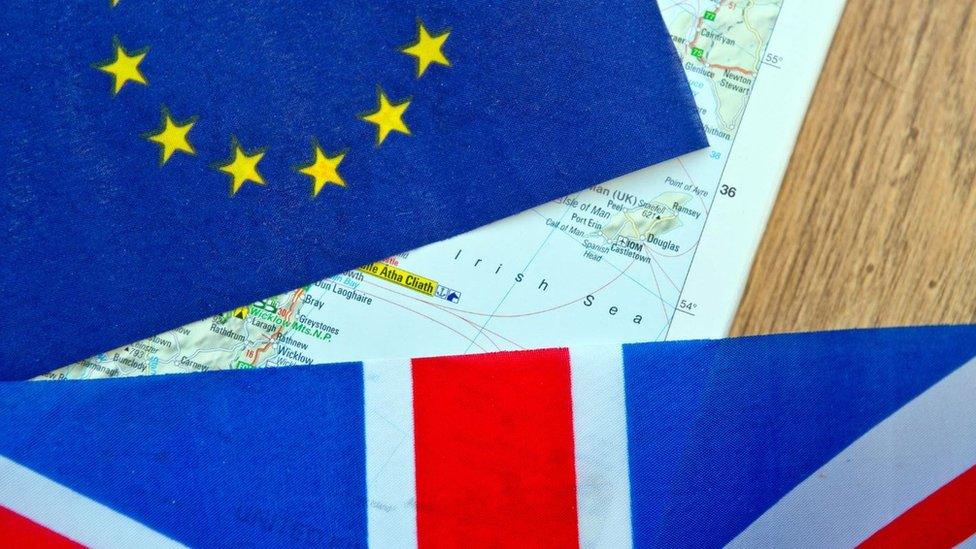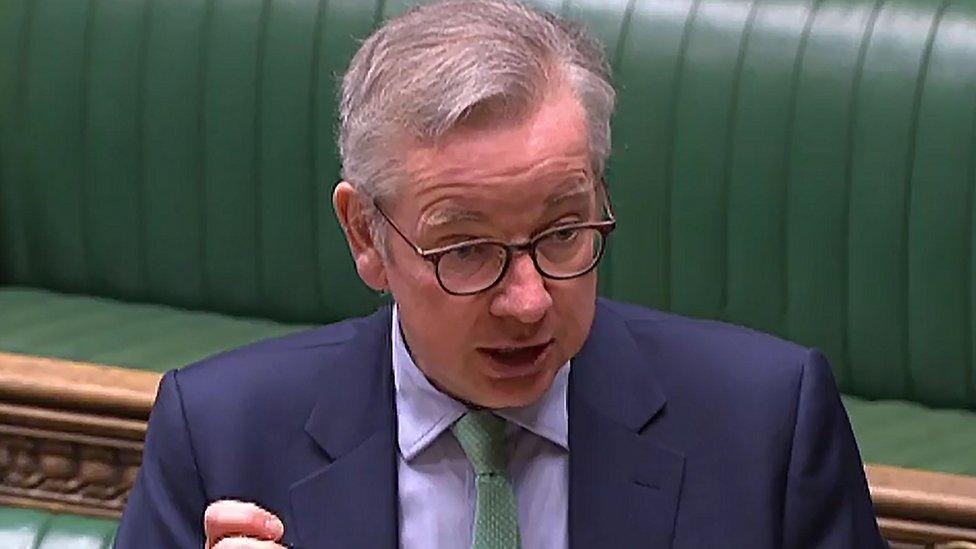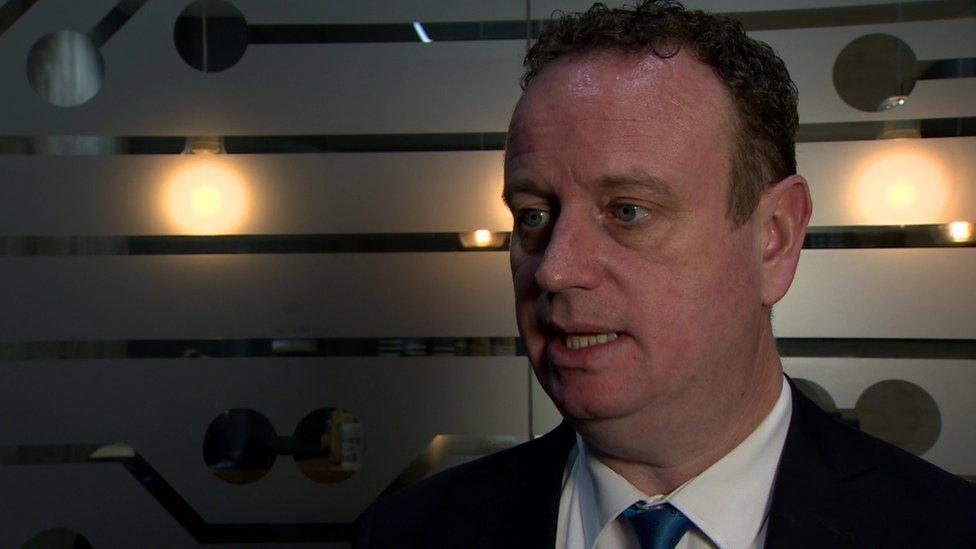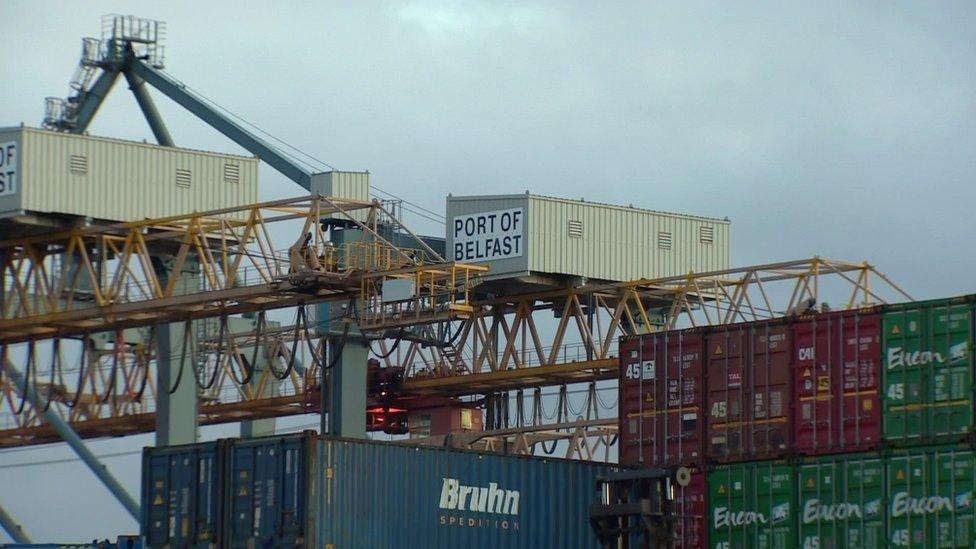Brexit: 'Clock ticking' for detail on GB to NI trade checks
- Published

When Michael Gove told the House of Commons that Brexit will mean some new checks on goods being shipped from Great Britain to Northern Ireland it was both a predictable and a significant moment.
Predictable, because the government had conceded to checks on food and agricultural products in the Brexit deal which was sealed in October.
Significant, because in the intervening months ministers have at times appeared reluctant to accept what they had signed up to.
In the run up to Wednesday's announcement government spokespeople were insisting "we have always been clear that there will be requirements for live animals and agri-food".
It would take great generosity of spirit to accept there had been clarity on this point.
In January, the prime minister was still giving "emphatic" assurances about unfettered trade in both directions across the Irish Sea, as reported in the Irish Times, external.
But now businesses which will have to trade across this new sea border have the beginnings of clarity, although they would like a lot more detail soon.
Unless the UK government asks for a time extension, the new processes for Irish Sea trade will need to be operational by 1 January.
"It's an incredibly tight timeframe," said Seamus Leheny from the Freight Transport Association.
"We've got less than 230 days until the protocol has got to be implemented and in that time we've got to find out exactly what forms and IT systems we're going to have to use.
"The clock is ticking and everyone in the logistics industry needs these answers now."

Cabinet Office minister Michael Gove emphasised that trade from NI to GB would remain "unfettered"
The implementation plan, external published alongside Michael Gove's speech gives the broad shape of how the UK government would like the border to work, rather than the fine detail that Mr Leheny and his members need.
Its preoccupations are mostly political rather than technical.
It is also important to remember that key parts of the UK plan are aspirational and will need to be negotiated and agreed at the Joint Committee - the body overseeing the implementation of the Brexit deal.
For example, the government commits to no new paperwork or processes for Northern Ireland businesses sending goods to Great Britain.
This includes a commitment to no "exit summary declarations".
Whether or not this particular piece of administration will be required on NI-GB trade had been the subject of confused, sometimes contradictory, statements by ministers and senior officials.
The government now says these declarations won't be needed.
But that will still have to be agreed with the EU.
A recent EU "technical note", external on the deal was still referring to the need for "the introduction of customs procedures and formalities" for goods leaving Northern Ireland for Great Britain.

Stephen Kelly, chief executive of Manufacturing NI, said more detail was needed
"There remains the need to see much more detail on how the UK will guarantee unfettered access for NI goods to the GB market," said Stephen Kelly of Manufacturing NI.
"That needs confirmed as a matter of priority."
Tariff rebates
The part of the UK proposal which may cause the greatest concern to the EU is on customs.
Under the Brexit deal, Northern Ireland remains part of the UK's customs territory.
But goods entering from Great Britain and deemed at risk of being moved to the Republic of Ireland will be subject to EU tariffs - assuming that the UK and EU do not reach a deal that eliminates all tariffs.
The tariff could then be rebated if it can be shown the goods were consumed in Northern Ireland.
UK and EU negotiators will have to decide which goods are deemed "at risk", but the UK proposal is perhaps suggesting a more liberal approach than that laid out in the October deal.
The UK plan says tariffs should only apply to goods with a "genuine and substantial" risk of crossing the border into the Republic - qualifying language which the EU has not used.
So there is clearly going to be detailed, and potentially difficult, negotiation required.
For Northern Ireland businesses, the waiting goes on.
- Published20 May 2020

- Published20 May 2020

- Published24 October 2019